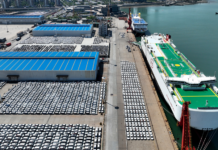KUALA LUMPUR,18 Mac: Malaysia’s economy is expected to recover for the remainder of 2021, with inflation and the current account balance normalising over the medium term.
The International Monetary Fund (IMF), in its latest Country Report, said Malaysia’s growth is projected to rebound to 6.5% in 2021, driven by a strong recovery in the manufacturing and construction sectors, and the impact of the vaccination rollout last month.
“The recovery would be uneven across sectors, with persistent weakness in high-contact industries. On the demand side, government spending and a recovery in both domestic and external demand would underpin growth,” the IMF said.
The current account surplus would decline to 3.0% of gross domestic product (GDP) as demand for pandemic-related equipment recedes and the rebound in domestic demand raises imports.
It also said the travel balance deficit would persist as international travel restrictions continue through the first half of 2021.
Inflation would recover to 2.0% as electricity tariff rebates expire and energy prices rise.
“Over the medium term, growth will converge to 5.0%, inflation will stabilise at 2.0% and the current account surplus will return to its downward pre-pandemic path,” it said.
Meanwhile, the IMF said an intensification of the pandemic or realisation of other risks could derail the recovery.
The current wave could be protracted or could be followed by another severe wave, prompting the authorities to lengthen the duration of the movement control order (MCO).
“This would intensify the supply-side constraints on economic activity and further dampen domestic demand. In this case, the recovery in 2021 would be significantly weaker.
“Also, on the downside, Malaysia’s highly open economy is vulnerable to escalating trade actions and weaker-than-expected trading partner growth,” the IMF said.
Domestically, fiscal risks from contingent liabilities could materialise while domestic policy uncertainty could dampen business confidence and investment.
Malaysia’s external position in 2020 is assessed to be stronger than warranted by fundamentals and desired policies, the IMF said, adding that the assessment takes into account the transitory nature of pandemic-related shocks.
Although the current account surplus helps reassure investors, it nevertheless represents a gap of 3.6% of GDP that cannot be fully explained by Malaysia’s fundamentals and desired policies and is partly driven by relatively lower spending on social safety nets in Malaysia.
Going forward, the IMF said policies that strengthen social safety nets and continue to encourage private investment can help facilitate external rebalancing.
On external debt, it said Malaysia’s external debt remains high but manageable.
External debt increased to 67.5% of GDP by end-September 2020 (63.4% in 2019), partly driven by higher non-resident holdings of ringgit-denominated debt instruments.
The share of external debt denominated in foreign currency stands at about two-thirds of the total, which is low relative to peers.
“Gross official reserves are adequate (US$107.6 billion at end-December 2020), at 126% of the Assessing Reserve Adequacy metric for a floating exchange rate regime.
“When adjusted for net forward positions, reserves are at 117% of the metric,” it added.



















